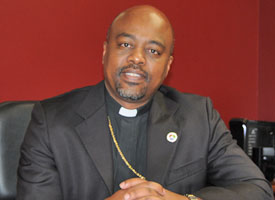By Paula Schlueter Ross
Even though it still faces challenges, Concordia College Alabama (CCA) in Selma, Ala., “is moving in the right direction — I have no doubt in my mind,” says the school’s president, the Rev. Dr. Tilahun Mendedo.
CCA — the only historically black Lutheran college in the country — is one of 10 colleges and universities operated under the auspices of The Lutheran Church–Missouri Synod as the Concordia University System.
Unlike the other CUS schools, CCA is located in an economically depressed area with few Lutherans, notes Mendedo. It’s also competing with state colleges that offer more programs for less money.
But in a three-day review of its educational programs this January — including more than 200 “compliance issues” that needed to be resolved from its last review in 2006 — Concordia College Alabama received a nearly perfect score of 99.8 percent from the Alabama State Department of Education.
“This is a good success story,” says Mendedo, who adds that the school “is blessed” to have the high rating “and we are working hard to maintain this quality.”
With two satellite classrooms — in Alabama’s Wilcox and Perry Counties — CCA is looking to launch more education and business programs. At this writing, the school offers bachelor’s degrees in Business Administration, Elementary Education and Early Childhood Education, and Mendedo says its graduates are held in high regard: all found jobs in their fields of study in 2012.
CCA also ended last year — its 90th anniversary year — $1.2 million “in the black” after many years of budget shortfalls.
Its student body of 515 is only 10 students short of its Spring 2013 semester goal, and Mendedo has set his sights on a Fall 2013 enrollment of 650 students — a challenge that’s “very doable,” he says.
Two dormitories that were damaged by floodwaters last fall have been refurbished, and a new student union with tables, a snack bar and study areas opened this year.
And the school sponsored March 1-2 its first Civil Rights Symposium: a free educational conference on the historic Civil Rights Movement with speakers, exhibits, panel discussions, student drama and music presentations, a parade and a memorial walk across the Edmund Pettus Bridge, site of the 1965 “Bloody Sunday” attacks on civil-rights marchers.
On Feb. 22, CCA announced a $5 million donor gift for new academic programs, scholarships, capital projects and other strategic priorities outlined in the college’s “A Time to Build” campaign initiative.
The gift — from the Rev. Mark Helge, president of the Marion I. Breen Foundation, and his wife, Kathy — is the largest single contribution in the history of the college and will serve as the lead gift in the emerging comprehensive campaign.
Even with that financial boost, Mendedo said he expects finances “to continue to be a problem,” primarily because most local students come from families with annual incomes of less than $25,000. Almost 80 percent of those students, he adds, are “first-generation college students.”
“These are students who are finding their way — financially, emotionally, sociologically,” with little or no family support, he says. Many are not ready academically for college and need help to keep up with assignments.
“This is a ministry for us, this is a calling,” Mendedo says, much like the work of educational missionary Rosa Young, who is credited with starting more than 20 Lutheran schools in central Alabama — including the teacher-training academy that became CCA — between 1916 and the 1940s.
“If she did it” — as a black woman, in the early 1900s, with little funding — “then how can we fail to do it now?” Mendedo asks. “It is a commitment.”
CCA’s mission still reflects Young’s vision: to “prepare students through a Christ-centered education for lives of responsible service to the Church, the community and the world,” Mendedo notes.
Along with academics, that education includes daily chapel services, Bible studies and Sunday morning worship at the on-campus Christ Chapel — named for the first Lutheran church Young founded in Alabama.
Mendedo’s vision is to make the school “a global institution of excellence and a leader in developing intellectual, spiritual and moral leaders of Christ-centered justice.”
Already CCA’s faculty, staff and students represent 19 countries, and Mendedo would like to see that figure increase.
“We are historically black — that’s who we are,” he says. “But is that our destiny? No. We are a diverse community of scholars where education, for us, is exposure to different cultures, different backgrounds.”
Mendedo says Concordia College Alabama has been able to do “so many great things with very limited dollars.” And he’s anxious, he adds, to see how the school’s Christ-centered education will impact lives in the years ahead.
To learn more, visit www.ccal.edu.
Posted March 13, 2013
